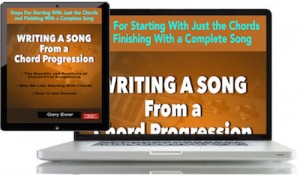Brainstorming is a great mental exercise in the creative arts. Brainstorming requires you to think quickly and to minimize judgment. When you work this way, your process is being fuelled by pure imagination, and that’s when you get to see what the inner workings of your creative brain can come up with.
If you find it hard to come up with song topics, brainstorming is a great way to get your mind moving.
 If you like starting songs by working out the chord progression first, you will love “Writing a Song From a Chord Progression.” It’s part of the 10-eBook “Essential Secrets of Songwriting” Bundle.
If you like starting songs by working out the chord progression first, you will love “Writing a Song From a Chord Progression.” It’s part of the 10-eBook “Essential Secrets of Songwriting” Bundle.
You can do this old-school, with pen and paper, or you can use a note-taking device on your smartphone, or even just speak and record your ideas. And it’s simple: write a list of 10 or more sentences that come into your mind.
And use your imagination — they can be fantasy-based ideas that might be serving as a metaphor for something else going on in your life. I did the exercise and came up quickly with these 10 ideas:
- Jumped in the air and flew across town.
- Planted a garden but nothing grew.
- Went for a walk in the woods, found an old abandoned cabin.
- My best friend won’t speak to me.
- My child’s first day of school.
- I love music, but I also love silence.
- I can’t understand what you’re trying to say.
- A friend in need is what I need.
- Everything seems better when the sun is up.
- Listening is better than speaking.
As you can see, they’re all ideas that need more in order for them to serve as the starting point for a song. Specifically, they need a story. And it could be (and probably will be) that some or many of these ideas won’t lead to anything.
But they’re all products of my imagination, things I came up with without thinking, calculating or — most importantly — judging.
Of those ideas, perhaps one or two might serve as the basis for a good song topic. But doing the exercise every day for a week gives you at least 70 imagination-based ideas, and from those 70 you’ve now got several ideas to try.
Once you see a statement that seems to have promise, take the next step: write a short 1- or 2-page story, something that uses that line, or describes the state of mind that lead to that statement.
Once you’ve got a story, you’ve got:
- a topic;
- a story based on that topic;
- some key words and phrases that might work their way into the song.
And now you are, as they say, off to the races! You’ll hopefully notice something important through this exercise: songs rarely succeed or fail based on the topic, but more often based on how much the lyric, and the kinds of words and phrases used, connects to a typical audience.
Songs are about feelings, and so the feelings a song generates will often be more important than the actual topic. A seemingly empty topic can succeed nicely if the words and ideas provoke an emotional response from the listener.
 Written by Gary Ewer. Follow Gary on Twitter
Written by Gary Ewer. Follow Gary on Twitter
 If you’re looking for one set of eBooks that will cover everything you need to know about writing songs –creating melodies, lyrics, chord progressions, and more — “The Essential Secrets of Songwriting” 10-eBook Deluxe Bundle is what you’re looking for. It always comes with a SPECIAL DEAL.
If you’re looking for one set of eBooks that will cover everything you need to know about writing songs –creating melodies, lyrics, chord progressions, and more — “The Essential Secrets of Songwriting” 10-eBook Deluxe Bundle is what you’re looking for. It always comes with a SPECIAL DEAL.










